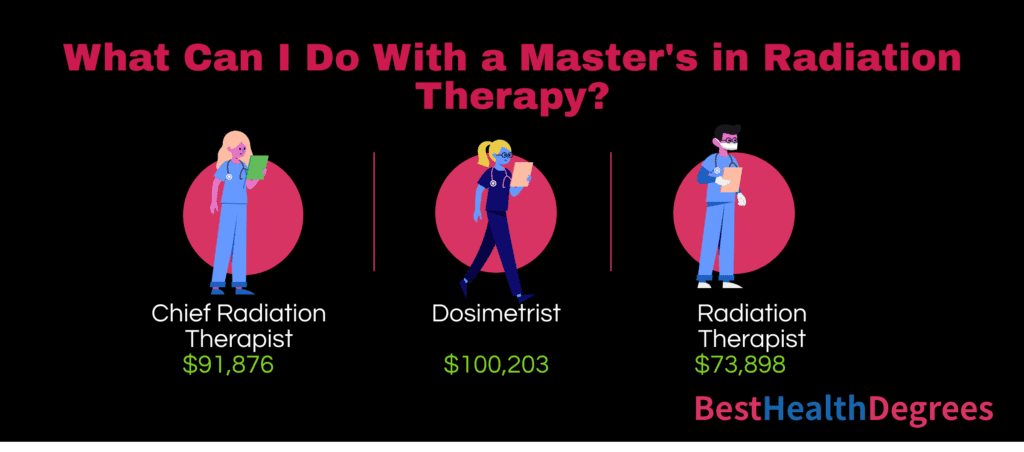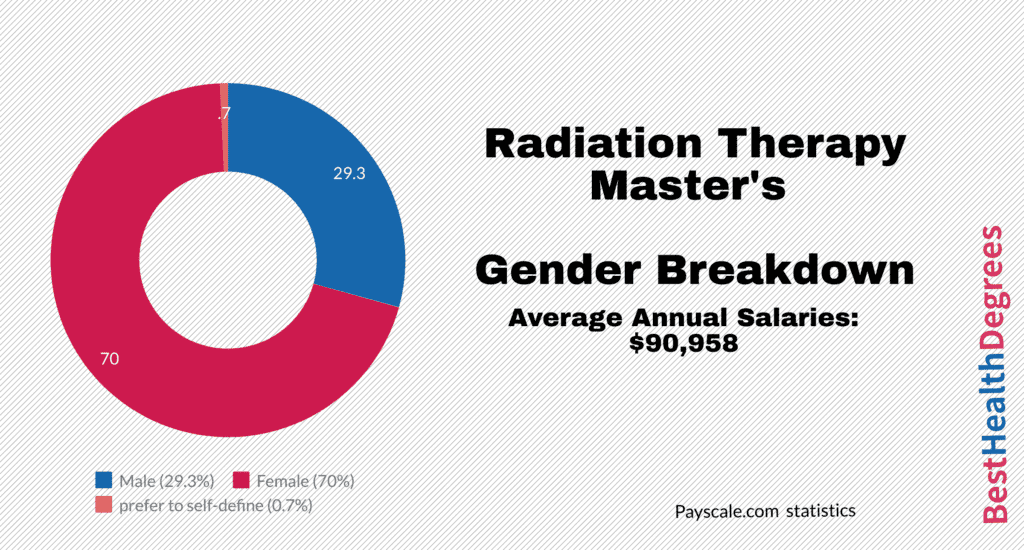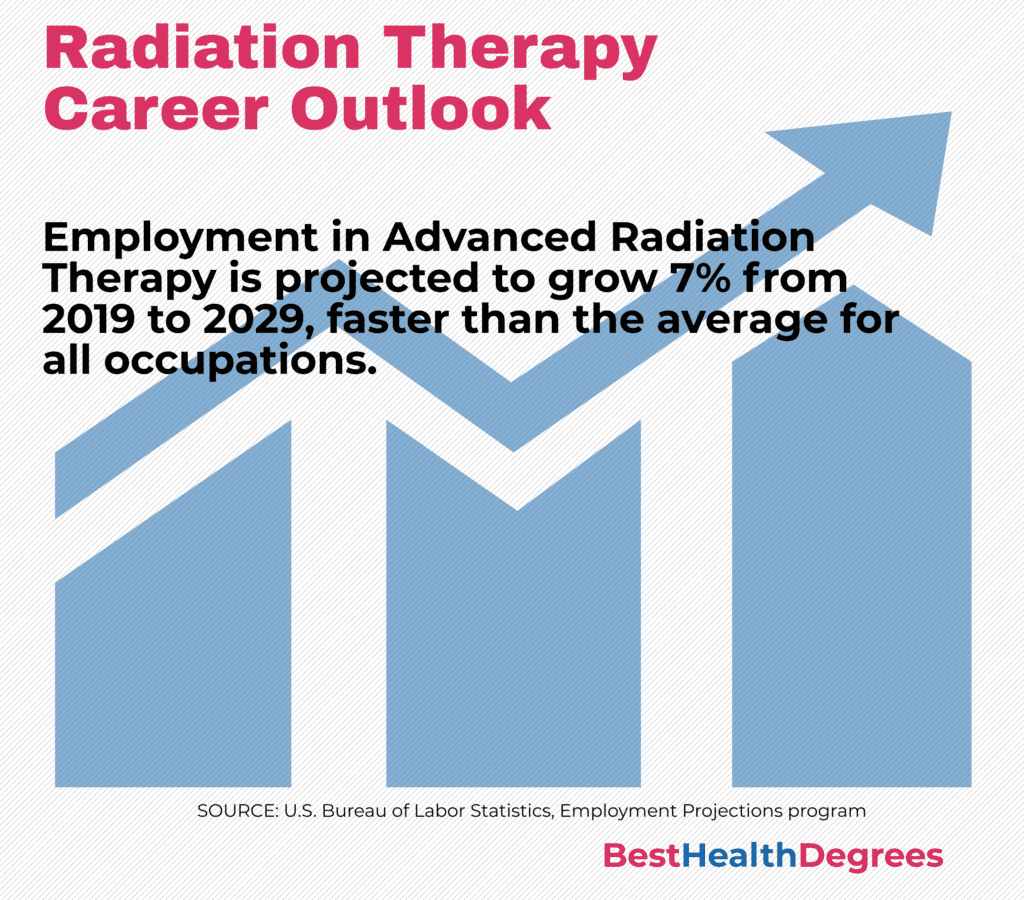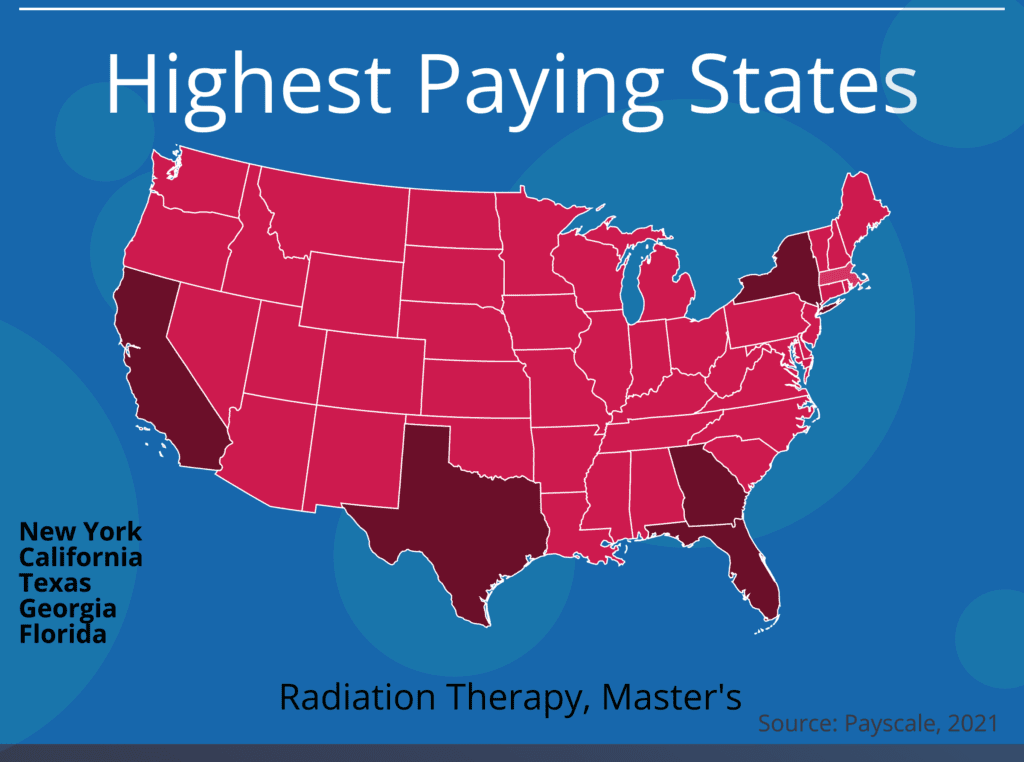Key Takeaways:
- Medical radiation science is crucial for cancer treatments and medical imaging, with careers starting from associate’s degrees.
- Radiographers use technology like X-rays to help diagnose and treat patients, and they need strong science and math skills.
- Radiation therapists specialize in cancer treatment using precise radiation doses, requiring strong communication and technical skills.
- Accreditation is vital for radiation science programs, with key accrediting bodies like JRCERT and ARRT ensuring high educational standards.
Radiation science and therapy are fundamental to modern medicine, from cancer treatments to imaging. While many people find the career in medical radiation they want at the associate’s or bachelor’s level, an advanced degree can open up a world of career potential.

What is medical radiation science?
Radiology technicians help oncology teams in monitoring and treating cancer patients. This field remains highly sought-after. Are people who have cancer in their lives getting the proper treatment? Radiotherapy may be an attractive field. Radiation therapy uses sophisticated equipment to remove cancer cells from patients. Radiotherapy jobs offer a wide range of salaries in addition to the possibility of specialization. A path to becoming radiologists requires training and official certifications.
Radiation science and therapy are fundamental to modern medicine, from cancer treatments to imaging. While many people find the career in medical radiation they want at the associate’s or bachelor’s level, an advanced degree can open up a world of career potential.
Getting a degree in medical radiation science can lead to a career in radiography. Radiographers facilitate patient diagnosis and help manage treatment through medical images using ultrasound, x-rays and magnetic resonance. Students in this field graduate to become part of a growing field of medical professionals who play an important role in diagnostic exam protocols. Many people in this field work in a clinical setting.
Radiographers commit to ethical behavior and high professional standards and require the ability to explain complex topics to patients and coworkers. Those who are good at math and science, and who communicate well may succeed in this field. As part of their job, radiographers use x-radiation to administer low doses of radiation. The job requires protective gear to ensure the safety of practitioners, co-workers and patients. It’s up to the radiographer to ensure patients don’t receive high doses of radiation. Radiographers and radiologists work in similar but separate roles but often collaborate.
Why get a degree in radiation therapy?
Getting a degree in radiation therapy can help you advance in your current career or help you switch to a completely new discipline. Radiation therapist often treat patients with diseases such as cancer. they use radiology equipment to complete tests that diagnose or detect abnormalities throughout the body.
Radiation therapist must be able to clearly communicate the treatment plan to each patient and ensure that they protect their patients from high radiation exposure. Patients are monitored following the treatment, and radiation therapist also ensure that the radiology equipment remains calibrated between uses.
As the person who handles treatment radiation therapists with strong technical skills can succeed in this field. Radiation technologist must be detailed oriented add follow exacting steps in order to treat the affected area with the precise amount of radiation needed. Additionally, most radiation therapists should have great skills when it comes to interacting with patients who may be uncomfortable, in pain or concerned for their welfare.
Most radiation therapy jobs are located in hospitals, but some outpatient care centers and doctor’s offices also need these technologists. Those in radiation therapy oncology specialize in cancer treatment. At a minimum, radiation therapist must have an associate’s degree from an approved radiation therapy program. Students who pursue a master’s can move into leadership positions and command higher salaries.

Accreditation for Radiation Sciences
The U.S. Department of Education tracks information regarding national and regional accreditation of colleges and universities. You can look up the credentials of a particular school on the Database of Accredited Postsecondary Institutions and Programs. DAPIP provides the relevant information on accrediting agencies and state approvals. Using this database can give students an idea of which online or on-campus programs reflect the highest levels of academic rigor.
Students looking for radiation therapy accredited schools can also directly contact various agencies that provide accreditations to colleges they are interested in. Accrediting organizations for radiologists and medical scientists include JRCERT and ARRT, among others.
The Joint Review Committee on Education in Radiologic Technology (JRCERT) sets standards for magnetic residents, medical dosimetry and radiation therapy programs. They monitor the promotion of patient safety, excellence and high-quality health care as well as the academic content of each program. Accrediting agencies typically want to see weather programs include physical, human and financial resources to help students succeed in the field. Colleges and universities must also document their efforts to continuously improve their programs. This helps them to meet accreditation standards upon regular review.
The American Registry of Radiologic Technologists (ARRT) is a global organization that represents the largest organization that provides medical imaging, radiation therapy and interventional professionals with credentials. The organization certifies technologists across these disciplines and administers ethics, education and exam requirements to work in the field. ARRT promotes safety and advanced will have new technology in medical radiological sciences.
ARRT accredited radiation therapy programs set high standards to promote exceptional patient care. They recognize individuals who pass certification exams and other qualifications for licensing and practice in radiation therapy and related fields.
Accredited radiation therapy schools have received certification by ARRT, JRCERT, or a similar agency. Additionally, radiation therapy accredited schools produce graduates in high demand. Prospective employers seek graduates of accredited radiation therapy programs to fill open positions.
Those wishing to move on to more advanced degrees will also need a degree from one of the accredited radiation therapy schools. Only an accredited radiation therapy program will be recognized by graduate programs.
Become a Radiation Therapist
A master of radiation therapy prepares students for clinical and research rules in medical physics. Graduates have the opportunity to prepare for advanced training or residency programs.
Types of Radiation Science and Therapy Degrees
With degrees from reputable radiation therapy masters programs, students prepare for careers as medical physicist. Many of them work in a clinical environment after they finish a residency. Others use their radiation therapy masters degree to provide clinical support in industry settings.
Getting a master of medical radiation science degree prepares graduates for a variety of contingencies. With a radiation therapy masters degree, students prepare to treat patients in advanced practices. Some students may choose to continue their education with a Ph.D. medical physics program.
With a master of health science in medical radiation sciences, graduates prepare for exams and licensing offered by various accrediting bodies. To learn more about the certifications and accreditations in your area, contact local employers or research job listings. This can also help you narrow down your choice of an online school for radiation therapy.
Those seeking a medical physics masters online may decide to pursue the master radiation therapy oncology program, which typically takes six semesters to finish with full-time attendance. Upon completing this degree, graduates gained the following skills:
- Provide top-notch patient care
- Practice administering radiation treatments using patient simulations
- Make beam modification devices
- Radiation Treatments – learn to treat adults and children
- deliver concentrated radiation therapy procedures
- Take dosimetry calculations
- Manage electronic records
- Operate radiation therapy equipment
- Use different techniques to take images using radiology and other technologies
Professionals working with radiation monitor the safety of patients and look for unusual reactions to make sure their radiation therapy treatments do not expose them to too much radiation. Researchers are constantly at work creating safer radiation therapies and more sophisticated treatment techniques. Professionals in radiation determine what levels are safe. Most students require two years to complete this radiation oncologist program and emerge prepared to take the appropriate national examination from the American Registry of Radiologic Technologists.

A strong online master of radiation therapy program gives students a high-quality education that includes the research and hands-on service students need to provide health care and their communities. An online master’s degree in medical physics provides a comprehensive education for students who want to graduate ready to take on a career in radiology. This program specializes in education or management. Therefore, this is an ideal masters in radiologic sciences online for students who want to advance their current careers in the radiology or radiography fields.
With a radiation science masters online, graduates often go on to train others to work in the field. Top radiation therapy masters programs prepare students to master radiological sciences so that they can fulfill roles in the health imaging field. Successful applicants have a baccalaureate degree and have obtained a license and some kind of diagnostic imaging techniques.
In order to pursue a radiation therapy masters degree, you don’t have to quit your current job. This program provides coursework for a master of medical radiation science that students can take while working full time. The online format for a master of health science in medical radiation sciences provides options for those who can attend traditional programs with in person classes.
With a medical physics masters online, Students can increase their salary and chances to advance out their current job. Many people seek a masters in medical physics online when they want to change careers or change jobs. An online masters degree in medical physics is a discreet way to further education without jeopardizing your employment situation.
Those with family obligations prefer a masters in radiologic sciences online, because a radiation science masters online gives them the flexibility they need to manage their responsibilities.
Certifications/Licenses
To find out about the certifications and licenses in your state, contact the relevant state board to ensure that you meet all the necessary qualifications. Getting a radiation therapy certificate program online from a certified college or university can help you find employment upon graduation.
A radiation therapy certificate online helps you prepare for exams needed to obtain your license or certification in your specialty. For those who want to be technologists working in radiology, it’s important to look for ARRT credentials for radiation therapy certification online programs.
Most radiation therapy certificate programs online help you gain an edge on the competition as well as satisfy the requirements of many employers who look for registered, certified technicians.
If you find yourself searching google for “radiation therapy certificate programs near me, a radiation therapy online certificate might be the best option for flexible study options.
Getting a radiation therapy certification online provides you with recognition of your qualifications. ARRT radiation therapy certificate programs online meet the high standards of this accrediting agency with a strong professional organization component.
“Radiation therapy certificate programs near me” may require you to attend all classes in person. Instead consider radiation therapy online certificate programs that prepare you for your role as a radiographer without eating up all your nights and weekends. You have to satisfy professional standards in interventional procedures, radiation therapy and medical imaging in order to graduate and pass your exams.
An online radiation therapy certificate program also shows that you meet the highest professional standards. State licensing boards, federal regulators and all employers value the ARRT credential. So, you will probably need it in order to find a job with a reputable employer. ARRT has more than 330,000 professional members. Complete your certification to join their ranks.
Why do so many employers require ARRT certification? Employers list this in their job listings to ensure that applicants possess the credentials needed to perform well and provide excellent patient care.
You also gain from this on a personal level. The skills, knowledge, and mentorship available by joining ARRT can also help you network and prepare for the exams. As a Registered Technologist (R.T.), you receive guidance on how to maintain your licensing throughout your career.
The exams cover theoretical, clinical and psychological aspects of radiologic sciences. Programs with this certification focus on career pathing and getting first-hand knowledge to succeed in the field.
Some of the job duties of people in this field include the following:
- Preparing patients
- Radiation Treatment
- Operating high-tech equipment
- Explain Treatment Plans
- Recognizing discrepancies
- Patient positioning
- Patient care
Choose the online radiation therapy certificate program that best matches your career goals. A radiation therapy certificate online prepares you for further study or job advancement as well.
Careers in Radiation Science and Therapy
Masters in medical physics jobs typically pay better than those they only require an associates or bachelors degree. As mentioned, salary considerations include whether you have experience in the field. However, education also plays an important role in whether you get the job over other qualified candidates. Masters in radiation health physics jobs have a smaller pool of candidates because there are fewer professionals with this qualification.
There are many reasons students pursue a radiation science masters jobs. Jobs with radiation science masters Often have more responsibility but more financial and personal rewards. Jobs with radiation therapy masters Can give you a sense of accomplishment and allow you to work with patients who need your care the most.
Other advantages of getting your radiation masters degree online include the following:
- Preparation for further studies. If you want to go on to get your doctoral degree, you will need to first complete your masters in an accredited program. Once you complete your doctoral degree, you will have one of the following designations: Doctor of Medicine (MD) or Doctor of Medical Physics (DMP).
- To complete the requirements for licensing. Some masters in medical physics jobs require an advanced degree. These jobs include radiologist assistant and similar support roles. The state board of public health can direct you to the requirements for radiation safety and accreditation for the role you wish to pursue. Many jobs will also have an educational component that you can meet by completing the right requirements for masters in radiation health physics jobs.
- To specialize in a specific radiology concentration. At the master’s level, you get to choose a concentration. This is similar to choosing a major in your baccalaureate degree. These programs build on your undergraduate studies and work experience, if applicable.
Examples of concentrations at the master’s level include the following:
- Imaging Informatics
- Radiation Therapists
- Radiation Oncologists
- Radiation Science
- Medical Imaging Science
- Radiologist Assistant (RA)
- Bioimaging or Biomedical Imaging
- Healthcare Administrator
- Radiologic Administrator
- Healthcare Manager
- Radiography Instructor
- Radiology Equipment Specialist
- Radiologic Educator
- Radiologist Extender
If you like the sound of the radiation science masters jobs, begin Looking into online programs for your specialty. Remember that jobs with radiation science masters can benefit you personally, professionally and financially. What jobs with radiation therapy masters appeal to you?

Salary for Advanced Radiation Science Professionals
You may wonder about radiation science salary possibilities. According to salary.com, this is a lucrative field. Radiation therapists work in a range of settings. With a masters in radiation therapy salary, you can score a job at the higher end of the salary range. The average clinical radiation sciences salary is just over $87,000. However, the range of medical radiation sciences salary jobs is $79,400 to $97,600.
An MS in radiation therapy salary Is typically on the higher end of that scale over a bachelor’s degree. However, it ranges widely depending on your location, the number of other radiology professionals with a master’s degree applying for the job, and your past experience and education.
According to the U.S. Bureau of Labor Statistics, Magnetic resonance imaging technologists make an average of over $73,000. The median wage includes what half the workers make or exceed in this field. In the lowest 10%, these professionals earn over $51,000, while the highest 10% earns $101,580.
For radiologic technologists, the BLS salary range is from $41,000 to nearly $90,000. The average salary for these technicians was approximately $61,000 in 2019. These are comfortable salary ranges when compared to other jobs in the medical field or other industries. The higher your education and the more experience you have, the better job opportunities you will get.
For the same time period, magnetic resonance imaging technologists were the highest-paid professionals in this field. Here are some examples of salaries for magnetic resonance imaging technologist in different settings:
- Outpatient care: $91,000
- Laboratories: $75,000
- Hospitals, government and private $73,000
- Doctor’s Offices: $72,000
For radiologic technologist, here are some examples of average salary ranges in different settings. These are somewhat lower than magnetic resonance imaging technologist.
- Federal government: $65,780
- Hospitals, government, private: $62,000
- Doctor’s Offices: $55,000
- Medical or diagnostic labs: $62,000
Professional Organizations
Joining professional organizations is a great way to meet others in the field outside of your local area. By attending webinars, conferences and subscribing to industry publications, students can keep up with what’s going on in the field. This is particularly important in a technology-centric fields such as radiography or radiology. Radiation therapists typically work closely with doctors and researchers.
Because there are so many professional organizations to choose from, it’s a good idea to ask around or do some research as to which organizations would most benefit your career pathing. You can join more than one organization, of course, but that can become an expensive proposition. Look for discounts available through your school or look for student discounts offered by the organizations themselves. Before joining organizations, research or communicate with representatives to find out how the organization helps its members find jobs and advance in their careers.
There are many professional organizations that can help you advance in radiologic professions.
For example, the American Association of Medical Dosimetrists (AAMD), is an international group supporting dosimetry professionals. Members gain from access to publication and educational opportunities as well as professional development initiatives.
The Association for Medical Imaging Management (AHRA) provides an opportunity for management to interact with their peers in hospital imaging department’s, group practices and other areas. It offers conferences, seminars, publications and professional development to its members.
The American Society of Nuclear Cardiology (ASNC) is unique among other professional organizations. It’s the only professional organization dedicated to nuclear cardiology. For students interested in this career track, ASNC membership is a great choose.
The American Society for Radiation Oncology (ASTRO) has 10,000 members working in radiation oncology and focuses on radiation physicists, physicians and radiation cancer biologists.
It’s important for students to look around and find the professional organizations that would benefit them the most. Professional organizations are a great way to stay current in the field and network for potential job opportunities.
Related Rankings:
Best Radiation Sciences Master’s Programs